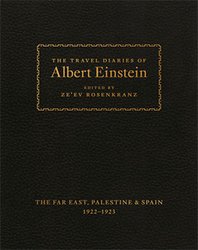EPP Senior Editor and Assistant Director Ze'ev Rosenkranz's latest book The Travel Diaries of Albert Einstein: The Far East, Palestine, and Spain, 1922 – 1923 will be released next week, June 6, 2018
"An eye-opening collection of travel diaries from the legendary scientist and thinker." Kirkus Reviews

"By the fall of 1922, Albert Einstein was among the most famous people in the world, a scientific celebrity who was about to win the Nobel Prize. This fascinating diary shows his human side as he travels to Japan, China, Singapore, Palestine, and Spain. The diligent and wise Einstein Papers editor Ze'ev Rosenkranz provides an annotated version that puts each entry into context and creates a treasure for scholars and Einstein fans." Walter Isaacson, Tulane University and author of Einstein: His Life and Universe
SYNOPSIS: In the fall of 1922, Albert Einstein, along with his then-wife, Elsa, embarked on a five-and-a-half-month voyage to regions that the renowned physicist had never visited before. Quirky, succinct, and at times irreverent, the entries record Einstein's musings on science, philosophy, art, and politics, as well as his immediate impressions and broader thoughts on such events as his inaugural lecture at the future site of the Hebrew University in Jerusalem, a garden party hosted by the Japanese Empress, an audience with the King of Spain, and meetings with other prominent colleagues and statesmen.
AUTHOR'S NOTE: Einstein wrote a total of six travel diaries while on five overseas trips, using two different notebooks on his last trip. Commissioned by PUP to edit all of Einstein's travel diaries, the basis for the first book in the series is work I carried out for Volume 13 of The Collected Papers of Albert Einstein. I've added to that a long historical introduction which necessitated more original research for this edition.
The introduction provides a radical new departure in the analysis of Einstein's political views. In previous studies, Einstein's public views have sometimes been deemed naïve, uninformed and/or overly idealistic. In my analysis, I attempt an examination into the unknown darker side of Einstein's opinions, prejudices, and stereotypes, especially about the members of foreign nations. These haven't been studied or presented in this fashion before.
